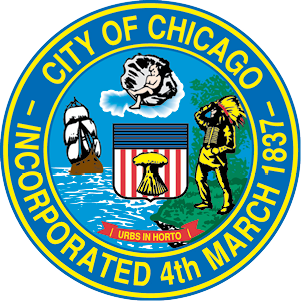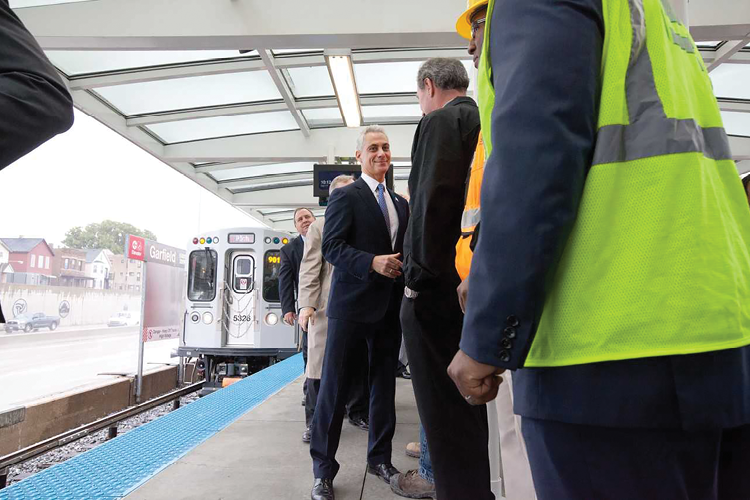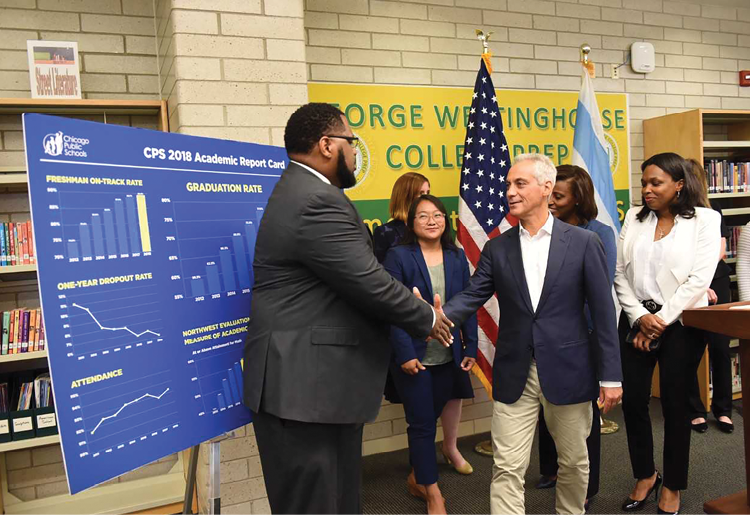- Home
- Media Kit
- Current Issue
- Past Issues
- Ad Specs-Submission
- Ad Print Settings
- Reprints (PDF)
- Photo Specifications (PDF)
- Contact Us


![]()
ONLINE

The Five Ts
Editors’ Note
Rahm Emanuel has served as the 55th Mayor of the City of Chicago since 2011. During that time, he has made the tough choices necessary to secure Chicago’s future as a global capital. The Mayor added more than 200 hours to the school day and year, taking Chicago from having the least educational time of any large school district in the country to being on par with its peers. He implemented full-day kindergarten for every Chicago child, and fought for and won new accountability measures to ensure every teacher and principal had the necessary resources to succeed. The Mayor’s comprehensive public safety strategy is focused on smarter policing strategies, tripling investments in summer jobs programs and mentoring for at-risk youth, stimulating neighborhood development and investing in proactive intervention strategies in historically divested communities. He recruited numerous companies to Chicago and helped to build the next generation of start-ups, while investing in the infrastructure, public transportation, open space and cultural attractions that make Chicago a great place to live, work and play. He has worked to make government more effective, to deliver better services at a more competitive price, and to open government to the public. Prior to becoming Mayor, Emanuel served as the White House Chief of Staff to President Barack Obama and served three terms in the U.S. House of Representatives representing Chicago’s 5th District. He previously served as a key member of the Clinton administration from 1993 to 1998, rising to serve as Senior Advisor to the President for Policy and Strategy. Mayor Emanuel graduated from Sarah Lawrence College in 1981 and received a Master’s Degree in speech and communication from Northwestern University in 1985.

You have been very clear about your priority to drive economic development and growth for Chicago. Will you discuss that priority and your pro-growth agenda?
I became Mayor and immediately asked McKinsey and Brookings to develop an economic plan that outlined our strategy for growth because I’m not just pro-business or pro-labor – I’m pro-growth.
When AT Kearney, IBM, and The Economist analyzed international cities for competitiveness, Chicago was listed as the second most competitive economy in North America and was in the top 10 worldwide.
It was the only city on the top 10 list worldwide that was not that country’s financial or political capitol.
AT Kearney, IBM, and The Economist all discovered what McKinsey had identified, which is our core focus on the five Ts: talent, transportation, training, technology and transparency.
Of the five biggest cities in America, Chicago leads the country with college graduates. We have more universities than any other city in the U.S. besides Boston. I travel the country and recruit kids from Harvard, MIT, Purdue, Stanford, CalTech and other universities to come to Chicago. Thirty-nine percent of our people have a four-year degree; New York is at 37 percent, LA is at 33 percent, and Philly and Houston, respectively, are at 31 percent and 32 percent.
In a race for talent, I want to make the most of it. I sit with my university presidents and go through their capital expenditures on new research. I also don’t just want four-year degrees and postgraduate work degrees. We designed the community colleges so that each school has a focus – one on healthcare, one on IT, one on professional services, one on advanced manufacturing and one on distribution and logistics.
We have the most diverse economy and I want to be able to tell any future employers that I can give them Booth graduates, Kellogg graduates, U of I Computer Science and Engineering experts, sales and marketing people from University of Michigan and University of Wisconsin, as well as those from Notre Dame, DePaul and Loyola. We can staff their entire operation and, in a time in which they need certainty around skills, we have the entire suite.
We have the highest modern transportation investment being made in both our aviation system and mass transit system. At O’Hare, we have added two new runways; we just opened a $1 billion expansion at Midway; and we have an almost $10 billion investment at O’Hare that will make it the only airport in the U.S. with a Global Alliance terminal and the only city where American, United and Southwest all have their major operations.
We will have three international terminals in the city of Chicago, which will be unprecedented.
We also now have the only public transportation with a 97 percent on-time arrival – New York is at 57 percent.
We are the only mass transit system with 4G service and half of our tracks will be new by 2019. I have dedicated a new revenue source to eliminate slow zones and take five minutes off of every commuter’s ride.
We’re definitely modernizing our transportation.
In addition, according to KPMG and others, we have made Chicago one of the top 10 global tech hubs in the world.
We have also repaired our public finances, which used to be a drain on our overall economic growth.
Every one of these individual Ts drives our economic strategy. Today, Chicago’s unemployment rate is 3.3 percent, which is below the national average.
Chicago has been the number one city for corporate relocations for five consecutive years.
For six consecutive years, Chicago has been the number one city in the United States for direct foreign investment. Last year, we were fifth in the world behind London, Paris, Singapore and Amsterdam.
We are working hard on the key elements that support and drive economic growth.

Mayor Emanuel tours one of the Chicago Police Department’s
Strategic Decision Support Centers in January 2017
Are these strengths of Chicago well understood?
People are beginning to understand it, especially those who make capital decisions in a
$3 trillion market and have picked Chicago first for six consecutive years. As I mentioned earlier, when it comes to corporate relocations, we’ve been at the top for five consecutive years.
Do we have our challenges? Yes. We have a challenge on the South and West sides as it relates to shootings, but we also have a lot of strengths. When a corporation is trying to expand and get access to talent, Chicago’s strengths relating to its universities, transportation, technology, training and education of the entire workforce stand out when compared to other cities.
Repairing the public finances has also removed one of Chicago’s big clouds.
You mentioned the challenge on the South and West side as it relates to shootings. How can you bring the city together as one community with the unrest that has occurred in certain parts of Chicago?
There is a short-term solution and a long-term one. One piece of it is policing and we’re adding 1,000 officers to the force. We have also developed one of the nation’s largest after school and summer jobs programs and I just announced a major expansion of our mentoring program for young men. We have had this program in the eighth, ninth and tenth grades for three years now in our 20 most challenging neighborhoods. We’re going to expand it into the seventh grade as well.
We also have the fastest growing graduation rate of any major urban school system and the key is to get kids through high school with a post high school education plan. By 2019, to get a high school diploma, one will have to produce a letter of acceptance from a community college, trade school or branch of the armed forces. If I can get kids to know that they have a tomorrow and to believe in themselves, then they’re not going to do something to mess that up.
Another key is making investments in the neighborhoods, but the most important thing is making investments in education. Stanford prepared a report on our programs which they titled Chicago’s Public Education, the Best in America for Urban Systems.
In the short term, we have to deal with policing and access to guns. Long term, it’s about education because that is the ticket to a better world and, if we can create access points, our young people will avoid being foolish and will believe in their futures.

Mayor Emanuel at the reopening of the improved Red Line South project in 2013
What have been the keys to driving change and taking action in Chicago?
The system is set up for a strong mayor and we had to have a plan and a vision. While some might not agree with a decision, we have never run away from a challenge. We didn’t run away from addressing the pensions, or the budget, or the shorter school day or year, or the fact that half of our kids didn’t even have a full day of kindergarten, or the fact that, at one time, we had one of the worst community college systems in the world.
We spent political capital to address systemic problems – we were more successful with some than others, but there is no challenge we faced where we decided to kick the can down the road. It doesn’t mean it’s always easy. The system is set up for a mayor who has spent time thinking through policy, who has created a vision for the city and who is able to set priorities and get things done.
Will you discuss your infrastructure investments and how critical this is to Chicago’s future?
Our main priority has been transportation. We have 4,500 miles of roads and we have paved 2,000 in the past eight years.
We had an $8.5 billion capital deficit in mass transit when I took office and we have erased that deficit. Sixty percent of our people, including myself, take the train to work and I know how important that is.
There is a reason why transportation has areas called choke points – if we don’t fix them, they’re going to choke the economy.
I have put a new station in Uptown. Since that time, 1,500 new apartments and 32 new businesses have gone into that area.
I closed and rehabbed the entire Red Line South, putting 1,800 people to work – including 200 people for which this was the first time they were ever trained for a trade. Five hundred people got hired as permanent bus drivers during the four and half months of construction.
Infrastructure and the mass transit system are key for the economic growth of cities.
One of the major reasons Chicago is a global world-class city is because of transportation. O’Hare is the only airport in the U.S. that goes to all six continents. We’re rated as the best connected city in the U.S. and the fourth best connected in the world. That is key to our global reach.
Investing in transportation allows the economy to function at 21st century speed. All the people that depend on it can have confidence in the system when they are booking their travel.

Mayor Emanuel announces that CPS students have achieved a record high graduation rate of 78.2 percent at George Westinghouse College Prep in September 2018
What do you tell young people about public service?
I encourage young people to give back to their cities and their country. We owe it to each other that we contribute all of the talents we have. One needs to give back, whether or not they make a career of it. Everyone should contribute to the community in some way. Giving to others is more rewarding than anything else. Being involved in the community is a version of public service.
Do you think about your next role?
It is about what is next for the city, not for me. It is not about where I’m going next but about what I’m doing while I’m here.![]()